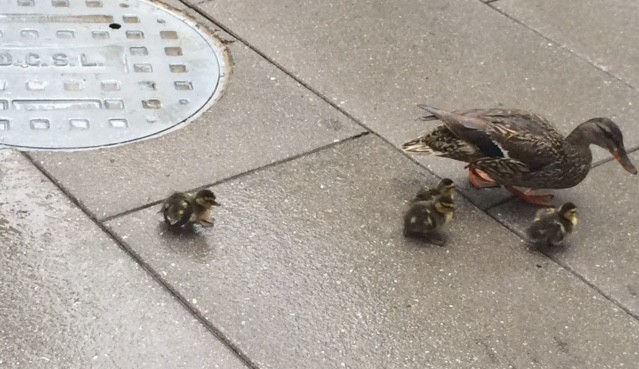
Within 48 hours of hatching, the mother duck leads her ducklings to a water source she has selected which is generally within a ¼ mile of the nest but can be up to a mile away. Depending on where she has laid her nest, this can be a harrowing journey.
Ducks are quite adept at avoiding traffic and most drivers will stop for a duck family crossing the road. If you have ever read the 1940s children’s book “Make Way for Ducklings” by Robert McCloskey, you may remember a scene where Michael the policeman stops traffic to help the ducklings cross the street. This is a very accurate portrayal of what can and does happen. People are generally very supportive of the mother and her ducklings and willing to help her if they can.
Interestingly, crossing the street is perhaps the least dangerous part of the duck family’s journey. Of more concern are various obstacles such as steps, fences, raised curbs and other barriers that are more than 5 inches high. Some ducklings may fall into grates or storm drains when they jump blindly into the street hot on their mother’s heels. Others get attacked by crows or gulls who are looking for a quick meal.
Every year Duck Watch, City Wildlife’s duck protection program, monitors nests around the city and helps mother Mallards lead their ducklings to water. Duck Watch volunteers monitored more than a dozen nests this year. One nest in particular drew quite a lot of attention.
On or around April 21st, a Mallard set up shop in a small planter at 1501 K St NW where she quickly acquired many admirers. Mallards can lay anywhere between ten and fifteen eggs per clutch. This female laid ten (one a day for ten days). Then she hunkered down for a long wait. During this time, City Wildlife received multiple calls and emails from concerned citizens. Some, who worked in nearby buildings, kept a watchful eye on her for the duration of her stay–making sure no one disturbed her or attempted to steal her eggs and sending City Wildlife frequent progress reports.
Only five of the Mallard’s ten eggs hatched. This is not an unusual thing to have happen. Sometimes, all of a duck’s clutch will hatch, but occasionally a few don’t.
Soon after they hatched, the Mallard began walking her ducklings around the sidewalk and, at about 4:00 PM, City Wildlife was called to help. The ducks were attempting to cross K Street at the height of rush hour.

Since stopping traffic on K Street during rush hour, while possible, would be extremely difficult, the volunteers decided to convince the duck to wait until traffic had died down. Every time she tried to cross the street, they would herd her back to her nest using their bodies and nets that they had brought with them. Eventually, she got the message or, at the very least, decided muscling her way through was a less than ideal option.
At about 6:45 PM, traffic started to slow and the Duck Watch volunteers determined that it was safe to help her across the street. Working together, the two of them stopped traffic on K Street until the mother and her ducklings had crossed into McPherson Square.
During this whole process, commuters and bystanders were extremely respectful and understanding. Most quickly became engrossed in watching this little urban drama unfold.
Once she got to McPherson Square, the mother duck was attacked by several unattached males who wanted to mate with her. The Mallard population always has more males than females, so there is a lot of competition during mating season. Usually, the female duck’s mate will protect her from other males but, since her mate was late in arriving, she had to fend them off on her own.
After gathering her ducklings who had been huddled together some distance away, the Mallard led her young to the southern end of the park where she was soon joined by another male. This was her mate who had finally arrived on the scene.
It was now about 9:00 PM and the ducks seemed to be settling in for the night. The Duck Watch volunteers headed home.
The next morning, volunteers checked Lafayette Square which has some small ponds, but found no ducks. They surmised that the Mallard family must have traveled a bit farther to reach the White House pool–a common temporary destination before the ducks move on to more natural areas such as Constitution Gardens or the Potomac River.
Since the Mallard and her mate were together, there was little reason to worry. The two of them would have some sort of grand plan about where they wanted to go and how to get there.
On Saturday morning, two days after the ducklings had hatched and they had began their march to water, a duck family matching their description was sighted at Constitution Gardens. Duck Watch volunteers believe this was the Mallard from 1501 K Street and her young duck family. Constitution Gardens is a good place for duck families to land. There is a lot of algae and duckweed for food and there are small ramps so the ducklings can get out of the pond. Some make it and some don’t, but our job as duck chaperones was complete as soon as she arrived at the pond.
Interested in getting involved? City Wildlife is always looking for volunteers to help out at our Rehab Center and with our Duck Watch and Light’s Out programs. Click here to learn more.


What a,great program!! Thanks to you volunteers for such an act of love
If we started a duck watch in Lexington, I would volunteer.